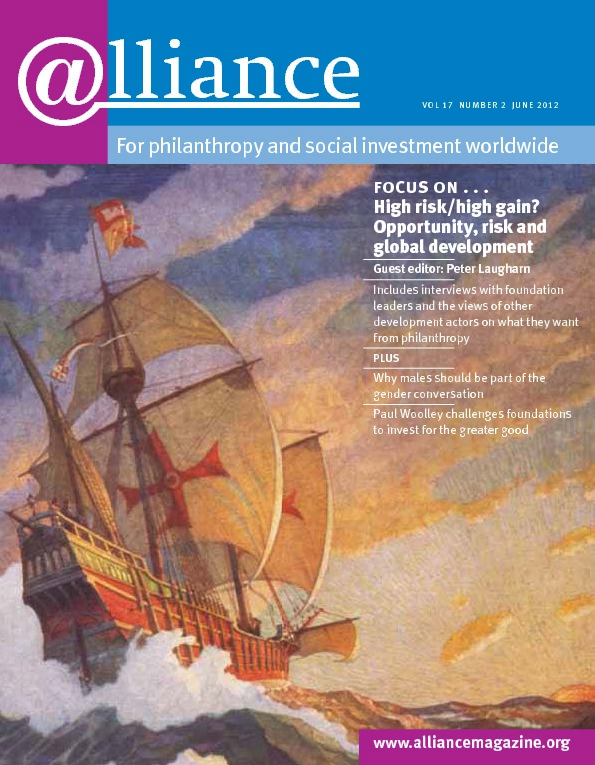A recent gathering in Bellagio discussed the role of foundations in international development. Both surprise and lament seemed to accompany the conclusion that foundations are more risk averse than they need to be. By implication, the nature of foundations – reflected in the ‘quality’ of their resources – should enable them to embrace the uncertainties inherent to most if not all development initiatives.
This expectation seems to stem from at least three factors: relative discretion, weak external sanction, and scrutiny after the event. By and large, foundations enjoy great freedom to act when compared with the constraints and sanctions faced by firms from their shareholders, by governments from the polity, and by non-profits from their funders. The nature of their resource base is one reason; their governance is another. A foundation’s governing body typically enjoys access to resources endowed ‘in perpetuity’. This anticipation of permanent income without recourse to others creates unique conditions for self-referential authority and little incentive to take risks. The governing board is responsible for achieving the organization’s tax-privileged social purposes; in other words, it determines policy towards risk. And these self-selected private ‘owners’ and guardians of identity are often pretty free to re-interpret a dead founder’s intentions, be actively guided by a living philanthropist, or learn from experience and update the organization’s role in the world as they see fit.
Their discretion is obviously not unbounded. Law, best practice, professional principles, industry norms and so on all play a role in setting operating conditions. Nevertheless, foundations can largely choose their priorities, rules, time frames, geography and scales of operation, performance metrics, and internal checks and balances. This freedom offers a distinct advantage when undertaking international development work.
A second factor favouring discretion is the lack of sanctions. Sanction by foundation grantees is almost unheard of, and sanction from the public realm is difficult to enforce, in part because scrutiny of any ‘prohibited’ or unwanted outcomes occurs after grants are made and usually at arm’s length from the foundation itself. This should add to risk tolerance since any political or reputational damage from grants gone wrong is unlikely to have fundamental consequences. Taking greater risk may not in fact be proportionally more risky.
In sum, relatively high discretion is probably the biggest contributor to the ‘quality’ of foundation finance for international development. So, how is risk approached in practice?
Foundations typically consider risk in a technical way where:[1]
A foundation thus views a potential grant in terms of the ‘events’ – the activities required for intended outcomes and the outcomes themselves – and the likelihood of them going awry, and the seriousness of the damage if ‘awry’ happened. Foundations involved in international development often have subject specialists as well as overseas offices and/or headquarters staff from the countries concerned to make these assessments. Risk is reduced by adequate knowledge and professional insight.
But being better at assessing risk is not the same as being more risk-tolerant. Foundations’ calculations of downside risk systematically outweigh the upside gains of responding to opportunities. Why?
One answer could lie in the conservation of endowed capital, feeding a culture of prudence which works against radicalism in governance and strategy. Governing boards seldom invite controversial public figures to be members. Another factor may be the lack of incentives to take more risk than necessary. Why court uncertainty when it is not demanded internally and one can typically pick and choose from grantees externally? Simply put, conservatism and risk aversion are natural default positions. Answers may also lie in a pressure to spend endowment incomes. Riskier grants may be more problematic to disburse and more labour intensive for staff; they can distract attention and demand effort that is better expended on safer options.
In theory, foundations’ access to endowed funds and discretion in their use could make them inherently more risk-embracing than other types of development agency. But in practice it boils down to inspiration, policy and leadership as the critical variables in determining a foundation’s weighting of risk against opportunities. Nothing more, nothing less.
1 Jens Zinn (ed) (2008) Social Theories of Risk and Uncertainty Blackwell, London.
Alan Fowler is a former foundation programme officer, now professor emeritus at the International Institute of Social Studies of Erasmus University. Email ALANFOWLER@compuserve.com





Comments (0)